- Home
- Frank V. Webster
Bob Chester's Grit; Or, From Ranch to Riches Page 2
Bob Chester's Grit; Or, From Ranch to Riches Read online
Page 2
CHAPTER II
BOB FINDS AN UNEXPECTED CHAMPION
Among those who had heard the story of the swindling of the countrymanwere several reporters for the great metropolitan afternoon papers, andas the burly policeman dragged the pathetic figure of the grocer's boyto the cell, one of these, a particularly clean-cut, wide-awake youngfellow, exclaimed:
"Sergeant, that's the rawest thing I ever saw you do. I don't believethat boy knows anything more about those 'con' men, and probably not asmuch, as you do. It's a shame to lock him up, and I am going to give youthe hottest roast for doing so that the paper will stand for."
"You do, and you'll never set foot inside this station while I'm incharge," retorted the officer. "If you knew as much about old Dardus asI do, you wouldn't be so keen to champion this boy. The old man has beenmixed up in many a questionable transaction, and I shouldn't besurprised if it turned out that he was in league with these fellows whogot that country bumpkin's seven hundred and fifty dollars, and that heput the boy up to playing the part he did."
"I don't know anything about Dardus," announced the reporter who hadtaken up the cudgel in Bob's behalf, "and I don't care. If he is mixedup in questionable dealings, that doesn't mean that the boy isnecessarily a party to them. You can't tell me that a chap, with a faceas honest as that boy has, is a criminal."
"When you've been doing police stations longer, Foster, you will learnthat you can't judge criminals by their faces," snarled the sergeant,and as the other reporters heard this caustic comment, they laugheduproariously.
"Laugh if you want to," returned Bob's champion, "but I am going toprove the boy's innocence of any complicity in the swindle."
And without more ado, the reporter left the police station.
Although the representatives of the other papers had sided in with thepolice official who announced his belief in Bob's guilt, theynevertheless experienced a feeling of uneasiness, lest Foster mightafter all be right, and they were holding consultation as to theadvisability of investigating the story more thoroughly, when thesergeant exclaimed:
"Don't let that fellow worry you. I've known Len Dardus for years. He'sas crooked as they make them, and he never had an honest man work forhim that I know of."
As the acceptance of the police official's theory would save them thenecessity of investigating the story further, the reporters agreed toaccept his version, and to accord with it they wrote their stories.
As Jack Foster left the police station, his anger at the system whichmade it impossible for a person without influence or money to obtainjustice, was strong, and his heart went out to the boy, as he thoughthow he would feel, were he himself in his place.
"If that boy isn't honest from the soles of his feet to the top of hishead, I shall be the most surprised man in New York," he said tohimself, "and if my paper has any influence, I am going to get him outof his trouble."
Occupied with considering various plans for aiding Bob, Foster quicklyreached the store of Len Dardus, but as he entered and caught sight ofan old, gray-haired man, with a face in which craftiness was the chiefcharacteristic, he wondered if, after all, the police sergeant couldhave been right.
"Is this Mr. Len Dardus?" asked Foster, walking up to the counter,behind which this repelling creature stood.
"That's my name," snapped the proprietor of the store, adding as hescrutinized his questioner closely:
"What do _you_ want?"
"I want to know if you have a boy working for you by the name of BobChester."
"I have, but I won't have after to-night, I can tell you. I have no usefor lazy boys, and for laziness he can't be beaten. Here I sent him todeliver some goods more than two hours ago, and he hasn't got back yet,and this is my busiest day."
So disagreeable was the tone in which the old man spoke that Fostercould not refrain from remarking:
"Well, you do not seem to be overrushed with trade just now. However,that is neither here nor there. How long have you had Bob in youremploy?"
"Ever since he was big enough to be of any service to me."
"He's a good boy, isn't he?"
"No, he's not. Didn't I just tell you he has been gone over two hours,delivering an order that should not have taken him more than fifteenminutes at the most? No good boy would dawdle so about his business. Butwhy do you ask?"
Foster, however, was not ready to tell Bob's employer of his predicamentuntil he had obtained more information about the boy, and instead ofanswering the question, said:
"You misunderstood my meaning. I want to know whether or not he ishonest or has any bad habits."
"He has the habit of taking a long time to deliver his orders, and healways has some plausible excuse for the delay--although I never accepthis excuses. It isn't the way to bring up a boy. But he doesn't steal,and I don't let him go out nights, so he can't have any companions. Butwhy do you ask? What business of yours is it?"
"Just one more question before I answer you."
"You seem mighty long on questions, but I'll not answer another oneuntil you tell me why you are taking such pains to find out about Bob.He hasn't any friend but me. I'm his guardian."
So hostile was the grocer's manner becoming, and with such increasingsuspicion did he view his inquisitor, that Foster realized it would benecessary to explain Bob's predicament were he to be able to help him,and briefly he told the story that had been repeated in the policestation.
"That just goes to show my theory is right," declared the grocer, whenhe had been given the particulars of his ward's arrest. "If Bob had goneabout his business and delivered the order, instead of being tempted bythe offer of a dollar, he wouldn't have got into this trouble. It willbe a good lesson for him, and I shall be able to get along some way, Isuppose, until he comes back."
"But surely you don't mean to say that you are not going to do anythingto help him out of his trouble?" exclaimed Foster in amazement, as heheard the heartless words.
With a depreciating shrug of his shoulders, Len Dardus responded:
"But what can I do? It will cost money to hire a lawyer, or even to bailhim out. Besides, as I said, it will be a good lesson for him."
"But hasn't he any money of his own?" queried the reporter.
"What do you want to know for? Are you a lawyer? No, sir! if you are,and have come to tell me about Bob in the hope that I will hire you, youmight as well go back to your place of business. I won't spend a cent onhim. The lesson will do him good."
The heartlessness of the grocer incensed Foster, and he retorted:
"It happens that I am not a lawyer, so it isn't any money that I amafter. I am acting simply from a desire to see the boy get fairtreatment, and if I were his guardian, whether he had any money or not,I would do everything in my power to help him out of his trouble."
"But what can I do? There is no one to stay in the store here, and Idon't see how I could help any way."
"You could go down to the police station and speak a word for the lad.If you have had the care of him for so long, what you could say inregard to his honesty ought to be sufficient to cause his release."
As he mentioned the grocer's going to the police station, Foster thoughthe noticed the old man tremble, as though in fear, and what the sergeanthad said about Dardus recurred to him, and while he hesitated as towhether or not he should press the point, Bob's guardian exclaimed:
"I can't go now. There is no one to look after the store. But perhaps Ican go down this evening."
"That would be too late. His case will come up in court this afternoon."
"Well, if it does, the boy'll have to take the consequences. I alwaystold him he shouldn't linger over delivering his orders. It will be agood lesson to him."
The incessant repetition of the last words grated on Foster's ears, and,realizing that he was only wasting time in trying to persuade thehard-hearted guardian to help his ward, he exclaimed:
"Then you refuse to do anything to assist Bob, do you?"
"Well, I don't know
as I would put it exactly that way. I'll see if Ican't do something this evening."
"Well, you may be obliged to leave your store, whether you want to ornot," retorted Foster, and with this enigmatical remark, the verysuggestiveness of which caused an expression of fear to settle on theface of the grocer, the reporter turned on his heel and left the shop.

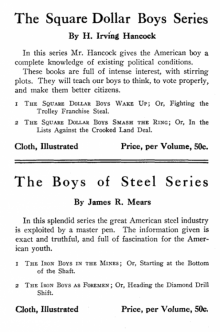 The Iron Boys in the Mines; or, Starting at the Bottom of the Shaft
The Iron Boys in the Mines; or, Starting at the Bottom of the Shaft Two Boy Gold Miners; Or, Lost in the Mountains
Two Boy Gold Miners; Or, Lost in the Mountains The Boys of Bellwood School; Or, Frank Jordan's Triumph
The Boys of Bellwood School; Or, Frank Jordan's Triumph Book of Cheerful Cats and Other Animated Animals
Book of Cheerful Cats and Other Animated Animals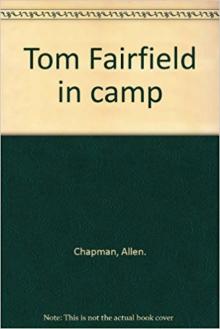 Ralph of the Roundhouse; Or, Bound to Become a Railroad Man
Ralph of the Roundhouse; Or, Bound to Become a Railroad Man Jack of the Pony Express; Or, The Young Rider of the Mountain Trails
Jack of the Pony Express; Or, The Young Rider of the Mountain Trails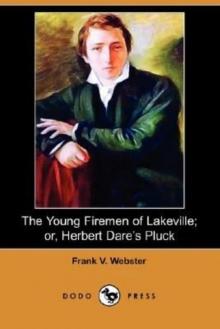 The Young Firemen of Lakeville; Or, Herbert Dare's Pluck
The Young Firemen of Lakeville; Or, Herbert Dare's Pluck Boy Scouts of Lenox; Or, The Hike Over Big Bear Mountain
Boy Scouts of Lenox; Or, The Hike Over Big Bear Mountain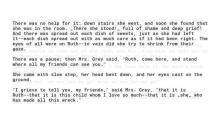 Book of One Syllable
Book of One Syllable Air Ship Boys : Or, the Quest of the Aztec Treasure
Air Ship Boys : Or, the Quest of the Aztec Treasure Boy Pilot of the Lakes; Or, Nat Morton's Perils
Boy Pilot of the Lakes; Or, Nat Morton's Perils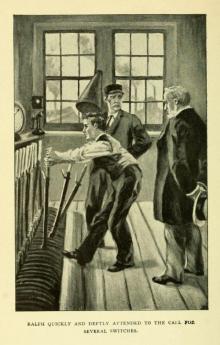 Ralph in the Switch Tower; Or, Clearing the Track
Ralph in the Switch Tower; Or, Clearing the Track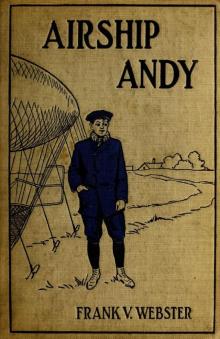 Airship Andy; Or, The Luck of a Brave Boy
Airship Andy; Or, The Luck of a Brave Boy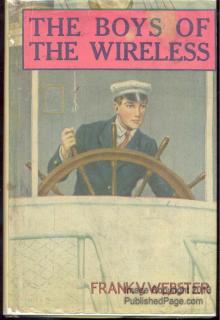 Boys of the Wireless; Or, A Stirring Rescue from the Deep
Boys of the Wireless; Or, A Stirring Rescue from the Deep Alfgar the Dane or the Second Chronicle of Aescendune
Alfgar the Dane or the Second Chronicle of Aescendune Boy Knight
Boy Knight Boy Ranchers Among the Indians; Or, Trailing the Yaquis
Boy Ranchers Among the Indians; Or, Trailing the Yaquis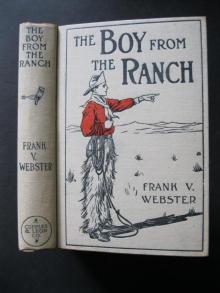 Boy from the Ranch; Or, Roy Bradner's City Experiences
Boy from the Ranch; Or, Roy Bradner's City Experiences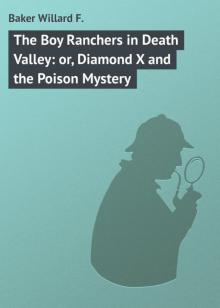 Boy Ranchers in Death Valley; Or, Diamond X and the Poison Mystery
Boy Ranchers in Death Valley; Or, Diamond X and the Poison Mystery Boy Ranchers on the Trail; Or, The Diamond X After Cattle Rustlers
Boy Ranchers on the Trail; Or, The Diamond X After Cattle Rustlers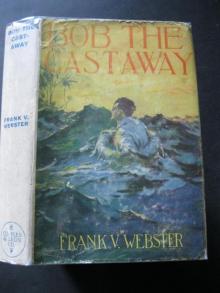 Bob the Castaway; Or, The Wreck of the Eagle
Bob the Castaway; Or, The Wreck of the Eagle Boy Ranchers in Camp; Or, The Water Fight at Diamond X
Boy Ranchers in Camp; Or, The Water Fight at Diamond X Boy Ranchers; Or, Solving the Mystery at Diamond X
Boy Ranchers; Or, Solving the Mystery at Diamond X Boy's Ride
Boy's Ride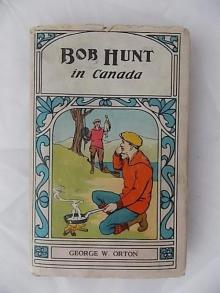 Bob Hunt in Canada
Bob Hunt in Canada Boy Ranchers on Roaring River; Or, Diamond X and the Chinese Smugglers
Boy Ranchers on Roaring River; Or, Diamond X and the Chinese Smugglers Alida; or, Miscellaneous Sketches of Incidents During the Late American War.
Alida; or, Miscellaneous Sketches of Incidents During the Late American War.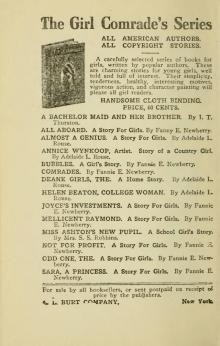 All Aboard: A Story for Girls
All Aboard: A Story for Girls Bob Chester's Grit; Or, From Ranch to Riches
Bob Chester's Grit; Or, From Ranch to Riches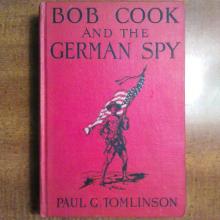 Bob Cook and the German Spy
Bob Cook and the German Spy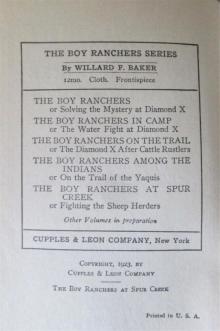 Boy Ranchers at Spur Creek; Or, Fighting the Sheep Herders
Boy Ranchers at Spur Creek; Or, Fighting the Sheep Herders